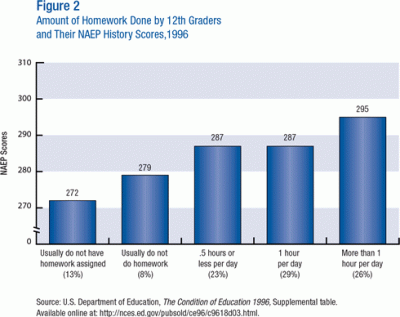More Homework, More Problems

All students have to do some sort of work once they get home, whether that be reading, filling out a worksheet or going online for a research project. Although not all classes give homework, the homework students are assigned can add up each night.
Going to school five days a week for 6-7 hours and then getting home and having to complete 1-2 hours of homework has a big impact on students’ mental health. “Adding homework into the mix is one more thing to deal with — and if the student is struggling, the task of completing homework can be too much to consider at the end of an already long school day,” (onlinedegrees.sandiego.edu).
Having less homework can be a great alternative to completely getting rid of it and can still have benefits. Homework can help students in the long run, even if they are given more than they should. It is understandable why many parents and teachers agree that homework benefits students, but completely getting rid of homework isn’t the goal, the amount assigned is what needs to be changed.
“You go to school, six hours a day, you do work and then they send you home with more work. There’s no point,” says freshman Kimberly Penaloza.
For students to be benefitted in class, teachers at North should minimize the amount of homework they give students each night. Many will argue that homework is great for students and a way for them to refresh their memory of what they have learned. And although homework can have benefits in some cases, the amount of work students are assigned is too large and overwhelming. “Since the quantities of time discussed here are totals, teachers in middle and high school should be aware of how much homework other teachers are assigning. It may seem reasonable to assign 30 minutes of daily homework, but across six subjects, that’s three hours—far above a reasonable amount even for a high school senior,” (edutopia.org).
Having too much homework has been shown to have negative mental health effects on students, especially those in high school. “A lot of assignment leads to mental and physical health problems for students. Over seventy percent of students say that school work makes them experience stress often with too much homework being the number one stressor,” (atlasofscience.org). In other words, having less homework per class period would be healthier for students and their mental health.
Most students have homework for four out of six classes, which can average up to two hours a night. This time can be used for other activities that won’t cause stress and can even help. “If children are given too much homework, they won’t have enough playtime, which can impact their social development and learning. Studies have found that those who get more play get better grades in school, as it can help them pay closer attention in the classroom,” (uopeople.edu). If students at North had less homework, they would have more time to do other things like spend time with family, play sports, or relax.
“It depends on the teacher because I know some teachers, who won’t be giving out that much homework. But others will give like tons, like every week, like I have a teacher that gives me a journal every month, and it’s multiple paragraphs I have to do every time,” freshman Rachel Sanchez explains.
The stress and worry that homework causes can be damaging for students and make it hard to relax and focus. “That means that by asking our children to put in an hour or more per day of dedicated homework time, we are not only not helping them, but according to the aforementioned studies — we are hurting them, both physically and emotionally,” (onlinedegrees.sandiego.edu). If teachers give less homework, they would see a positive effect on students in the classroom while doing classwork. Students would have more time that they can use to focus on what is going on in the classroom and can therefore begin to further succeed and raise their grades.
Although there are different opinions and pros and cons to how much homework students are given, we would benefit from at least a small decrease in the assigned amount overall.





